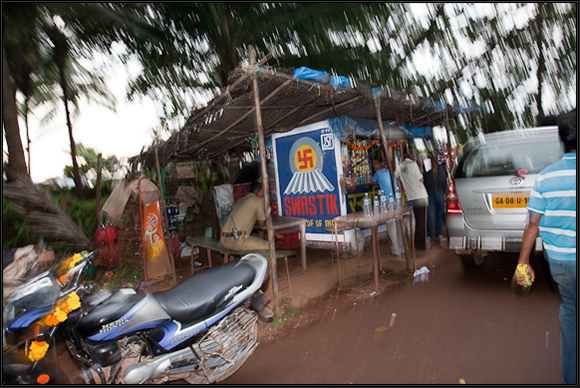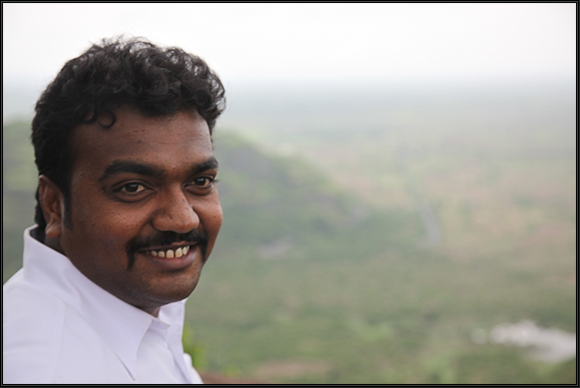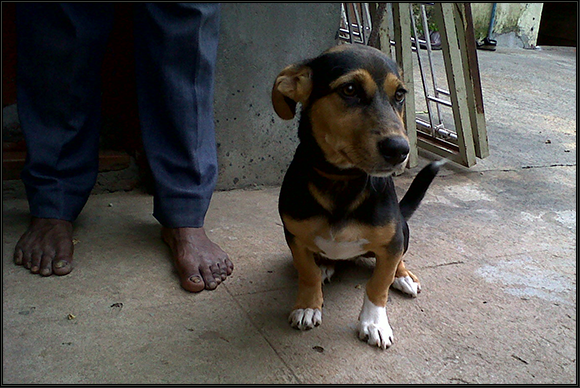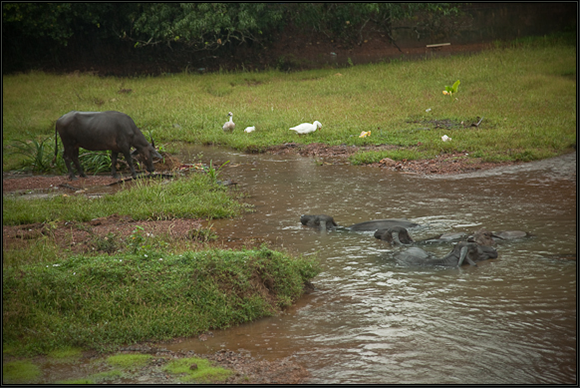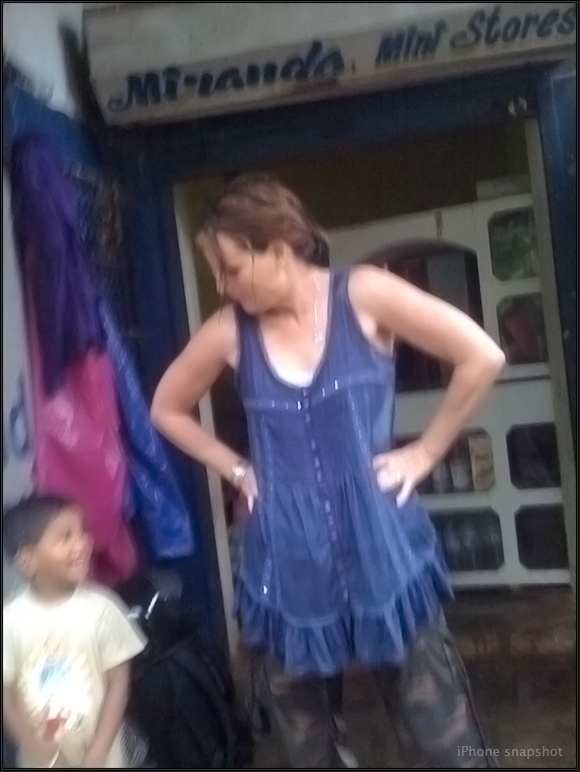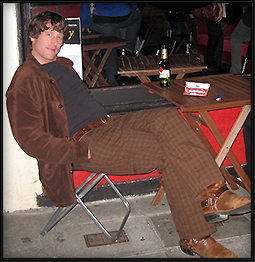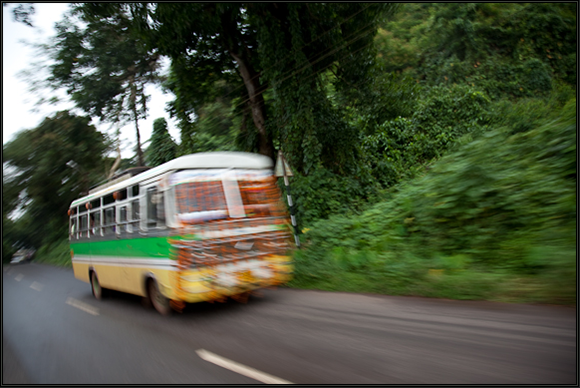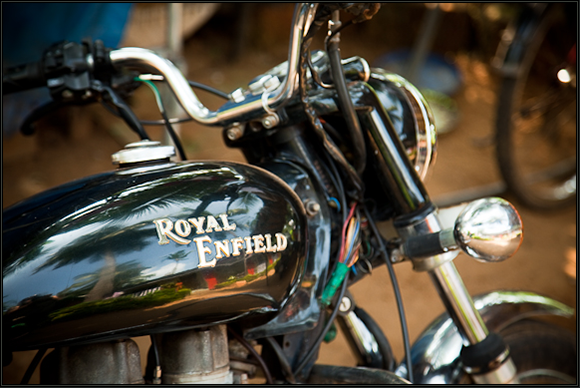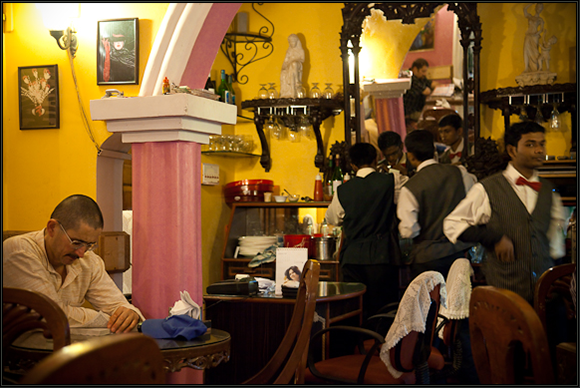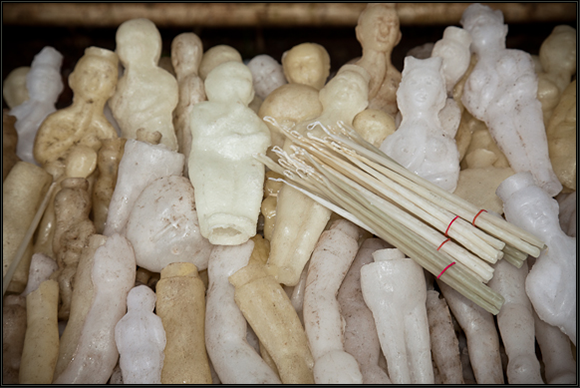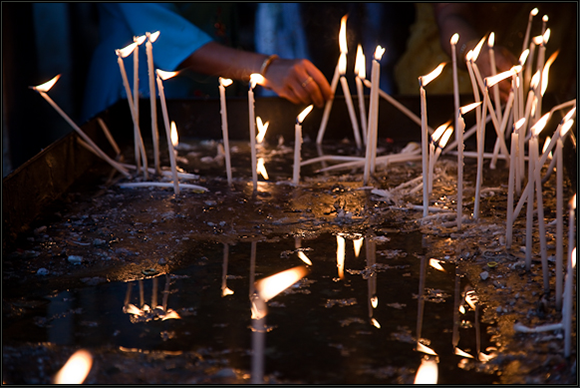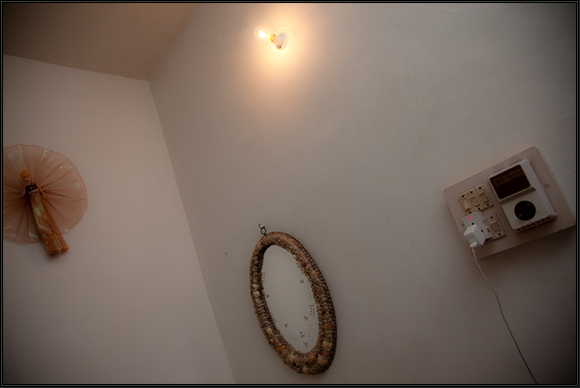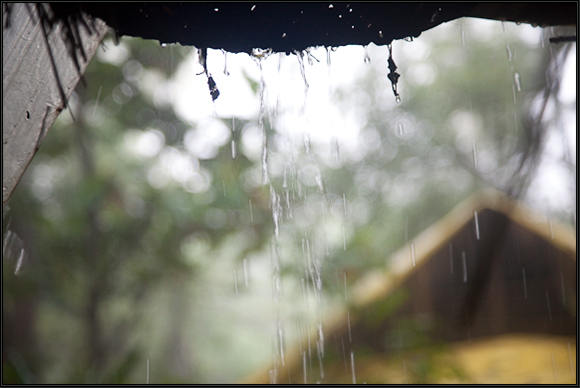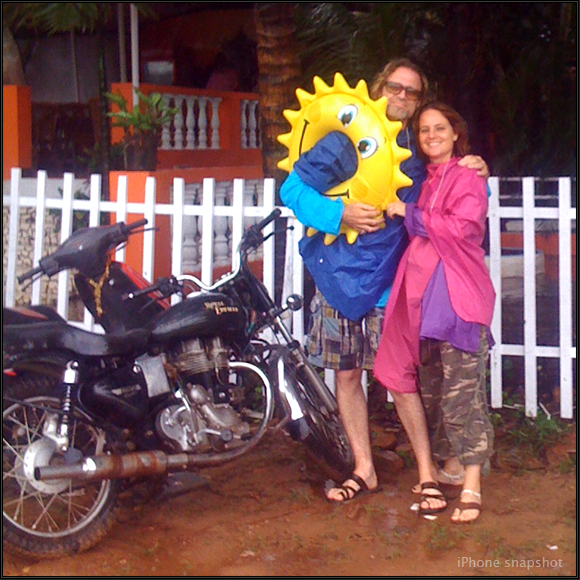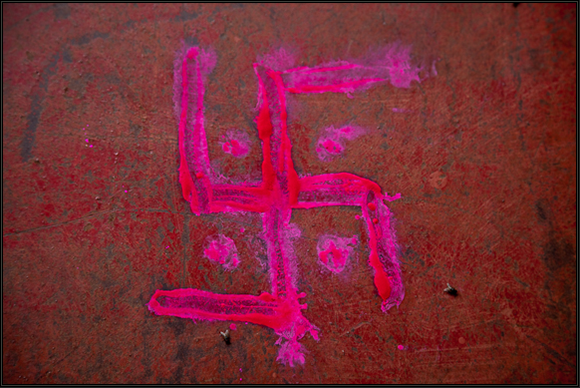Continued from Part Two.
Eventually we are rescued from the dwarf’s bar, and from his kids, by the guy who rented us the Enfield in the first place, and we roll back into the tiny beach town of Palolem. The place is crawling with waterlogged young Israelis who also missed the monsoon memo. The main street in town is flooded with eighteen inches of water, which we have to wade across to get to the travel agent’s office, so that we can check on the likelihood of our bus actually leaving tonight.
We’re assured that the bus will be leaving as scheduled.
We hole up in a restaurant that serves something they call “pizza,” and watch the rain pour off the roof like a waterfall. The field across the street has gone from a field, to a swamp, to a swimming pool. A few hours later we wade back through the murky water to check in with the travel agent.
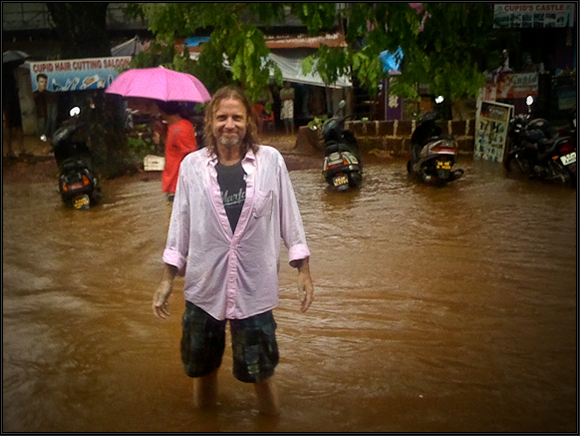
.
“Buses having number of yours. They contact with too much rain. Worrying there is not need,” the travel agent says without looking up. Phil and I are used to untangling sentences like this. We worry about what it is doing to our brains.
The small storefront is now crowded with refugees, standing on the stoop and at the window watching people wade through the water. The room lights up with flashes of lightning then rumbles eerily with thunder. Every few minutes the entire place bursts into laughter when an innocent steps blindly into the deep end of the street and is swallowed up to their neck.
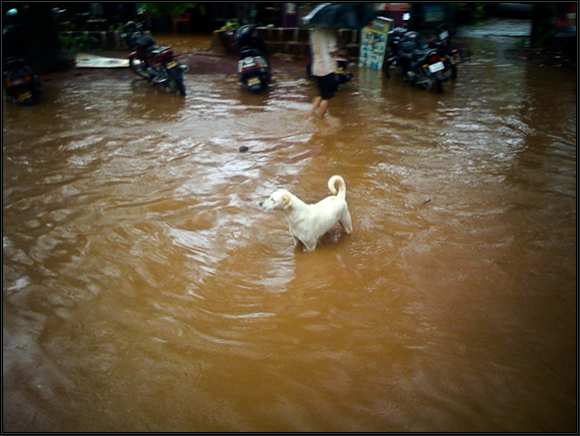
.
I look down at the twin burns on my calf, realize that wading through brown flood waters in an Indian village is probably the worst thing I could do for my blistered wound, and become obsessed with imagining the bacteria that are surely taking up residence in my leg. I panic at the infection that will come and the gangrene that will follow. The next hour will be spent going from shop to shop trying to find gauze and antibiotic cream, and enough tape to create a waterproof seal.
Phil, meanwhile, is completely unmoved by my plight, and has decided that he needs new sunglasses. He goes from crappy store to crappy store looking for the perfect pair to make him look like a Bollywood gangster.
![]()
We decide to leave early for the station so there is no chance of missing our bus. The station is only four kilometers outside of Palolem, so we load our luggage into a tuk-tuk and brave the puddling roads. When we arrive, I show our tickets to the man at the counter, who secretly molests my finger while he looks deep in my eyes and informs me:
“This, madam, wrong junction. Wold bus stand, fi minute walking only.”
I yank my hand away and storm off.
“We’re at the wrong place,” I inform Phil. He looks around, at dozens of buses at dozens of terminals, with hundreds of people boarding the beasts.
“This isn’t the bus station?”
“Apparently our bus stops at the ‘wold’ station, five minutes that way,” I say, pointing that way.
We lug our stuff into another taxi.
“One hundred rupees,” the driver says. “One hundred rupees to wold bus stand.”
“Are you joking?” Phil shouts, full of a brand of indignity that is only possible after being cheated and lied to, everyday for more than six months.
“Too much, we give you twenty.”
“No sir. One hundred. Raining.”
“Fifty,” Phil counters, “We give you fifty.”
The driver wobbles his head in a way that sometimes means yes.
“One hundred rupees, raining.”
While one hundred rupees is only about two U.S. dollars, in tuk-tuk terms this is a fortune. It might even feel worse because the driver has stated his intent to screw us, rather than just gouging us at the last minute. But by now our only dry clothes, the ones I’ve been keeping safe in a plastic bag so we’d be able to travel on the all night air conditioned bus without getting pneumonia, are getting soaked. I push Phil into the tuk-tuk and take over the transaction:
“Okay okay, one hundred, raining! Fuck it, who cares? It’s two dollars.”
A full minute and a half later the auto delivers us to the ‘wold’ bus stop, which is hardly a bus stop at all, and definitely not one hundred rupees away.
“Prrrrrick,” Phil growls, rolling his R’s dramatically after popping his P.
By now it is dark, and we stand under a sheet of corrugated metal for forty-five minutes, asking everyone who passes if this is really where the bus stops, and if they think it’ll come at all in this storm, and every answer is different. I call the bus company directly, and I’m assured the bus “will arriving” at some point. The rain pools and leaks through the metal roof. I don’t believe that the bus will really come, so I call again, and they hang up on me. I call back, and this time the guy gives me the phone number of the bus driver! I fish around in my wet purse for a pen and paper, and write the number on Phil’s arm with eyeliner. We call again and again, but there is no answer.
A taxi, parked next to the bus stop with the driver asleep in the backseat, comes to life, and a brittle version of It’s a Small World After All plays as it backs up. This is normal here: Indian cars have backup songs! Silent Night, La Cucaracha, Greensleeves, Für Elise, but right now it doesn’t feel like a small world. It feels like a giant world, made up mostly of water, and everything I know feels far, far away, and there are things about India that are so strange they defy gravity.
After another hour passes, we carry our stuff across the street and take refuge in a sweaty little restaurant where the shirtless cook is slinging slimy slop into stainless steel trays at the speed of sound. We sip hot chai tea while Phil charges his phone for the first time in two days.
We scroll through the news on the iPhone, and we learn that we are at the epicenter of an extremely massive monsoon season flood. Villages are submerging all around us, and people are drowning just five kilometers from where we are sitting. The roads are washed out, the train tracks are flooded, and the airport is closed. Nearly a hundred people have already died in Goa and the neighboring states over the past three days. Families are stranded on rooftops; crops have washed away; refugees are crowded into temples and government buildings; food is being airdropped by helicopter. Turns out this is the worst storm and flooding in more than 40 years, and the rain is still coming down.
Our bus is not coming tonight.
![]()
We coax a reluctant tuk-tuk driver to get us back to Palolem; he has to take a rather dodgy alternate route, since the main road is now closed off. We manage to reclaim our room at the Bhakti Katir, but at double the price. It’s after midnight, raining like a bitch, and they know we have little choice.
In our little cabin, the air is so moist that the mattress is damp through and through; it bleeds moisture into the sheets, and into the clothes we are sleeping in. The outside bathroom, the one that was so cute when we first arrived, loses all its charm the first time I have to pee while holding an umbrella over my head.
The next morning, we book a flight back to Bangalore for Monday; now we have four days to aimlessly knock around Palolem, waiting for our flight, and hoping for the best.
Some people would call this vacationing, but we don’t know what to do with ourselves. There are no movies, no media, no computers. We read, and spend hours writing in notebooks. We eat, then wait to get hungry, go somewhere else, and eat again. We’ve already bought all the Ali Baba pants, gangster glasses and wraparound skirts made of old sarees that anyone could want. And I’ve had to talk Phil out of getting a tattoo three different times, on the grounds that the tattoo artist we checked out yesterday, still sucks today. We feel like shipwreck survivors waiting to be rescued.
We are bored.
Phil decides that drinking will help pass the time. This confuses me: in the years I’ve known him, I’ve only ever seen him sip the occasional cocktail or a glass of wine, but now he’s ordering multiple piña coladas with every meal.
“Are you mad at me?” I ask meekly.
“No one drinks piña coladas because they’re mad at their wife,” Phil slurs, and touches his glass to mine. “Drink up.”
We rope strangers into our festival of boredom. One of them turns out to know about ten people we know in Los Angeles, and it actually is a small world after all. We get them drunk and make them listen to us complain about Natalie Merchant songs and dreadlocks. We tell them about India, because the more we drink, the more we have to say about this country. We discuss the language issues and the poverty, the child labor that is everywhere. We talk about how amazing our rooftop is at sunset when the eagles that swoop and hover overhead are swapped out for giant bats with two-foot wingspans. We talk about the kids in our neighborhood who come visit and try to teach me Kannada while they snack on whatever is in my kitchen that day. We ramble on about our driver Mustaq and how he promises me that he only hits his wife when she deserves it. We try to remember all the pushcart cries we hear from our bedroom window each morning.
We are wet and bored and miserable, and we know that leaving India is going to break our hearts.
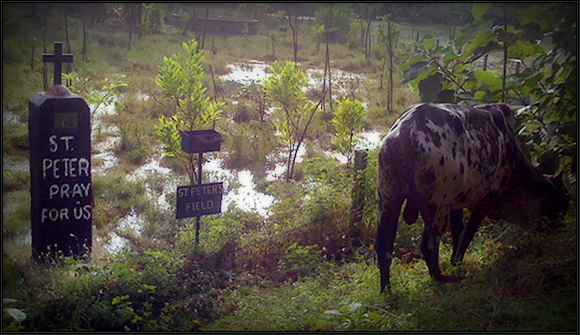
.
Epilogue
In the end we arrived safely back in Bangalore after an uneventful one-hour flight; but it took three hours to get from the airport across town to our house. Traffic was jammed on every thoroughfare, but not because of accidents, or flood damage; but because there were people in the street collecting rupees from every vehicle, for flood disaster relief. Bangalore was fine, but other areas of our state, Karnataka, were hit even worse than Goa. We tried to be mad because we just wanted to be home already, but we just couldn’t do it: we happily emptied our pockets and handed over the cash, before braving the final leg of our journey.

